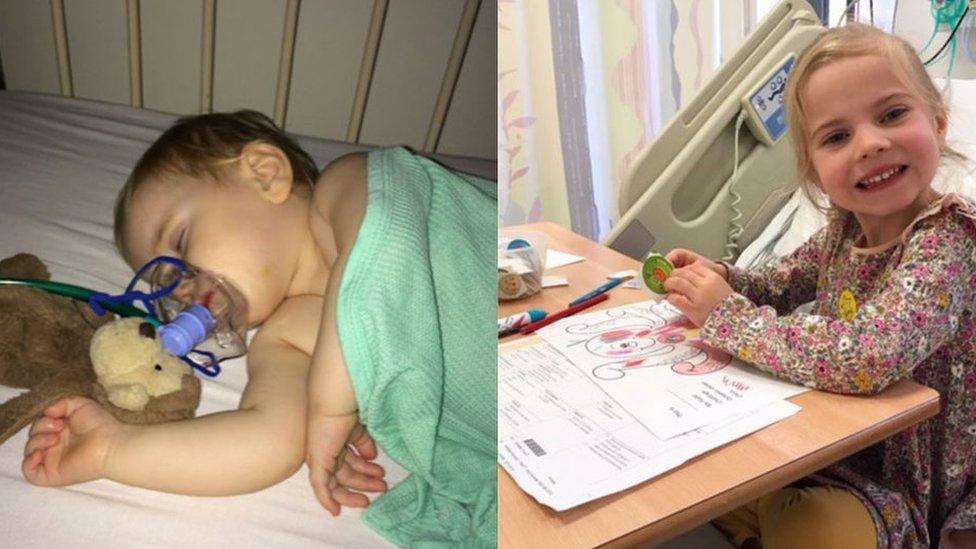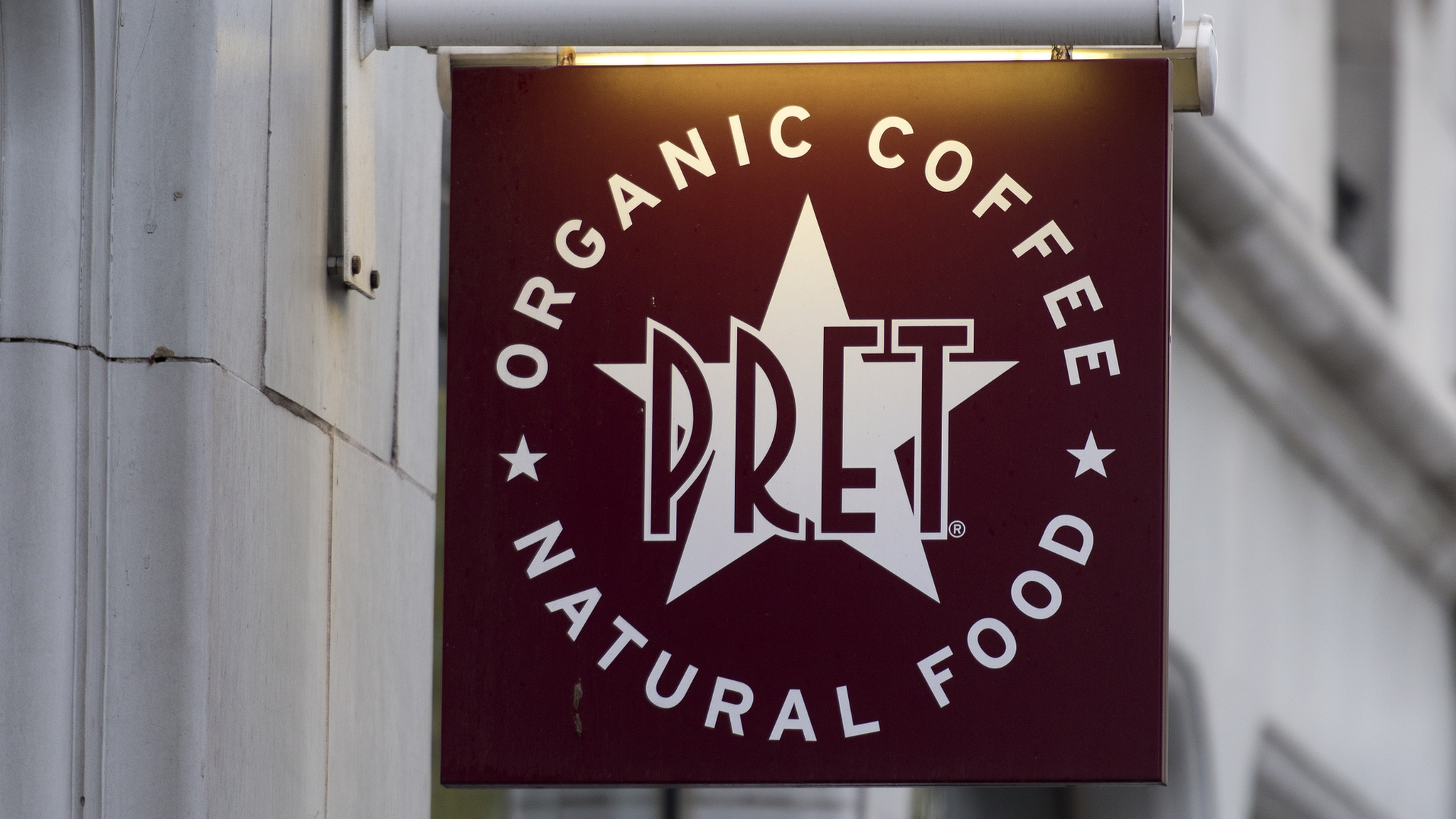Cow's milk allergy: 'Going to a coffee shop could kill my child'
- Published

Evie Kinsella has multiple food allergies, but milk is the only one that could be fatal for her
Like many five-year-olds, Evie Kinsella loves dancing, all things sparkly, climbing trees and trips to the woods. But going to a coffee shop could prove fatal for her. She was diagnosed with a cow's milk allergy as a baby and her condition is so severe that she reacts to milk particles in the air.
"It feels sad because I can't do everything, like have school dinners or go to parties and just have food like everyone else," Evie says.
"I feel worried about people coming close to me who have had cow's milk. They might make me poorly and wheezy. When I have a reaction it feels really scary and horrible."
Evie had eczema and was often sick as a baby, but it was only after eating a yogurt at six months old that she was diagnosed.
"She was screaming, her whole face swelled up, mucus was pouring out of her - it was like something from a horror film," her mother Katie recalls.

Evie has been hospitalised several times after reacting to airborne milk particles
A month later, Katie, from Needham in Norfolk, was out having coffee with a friend when Evie began to wheeze in her pram, because she was reacting to the milk in the air. They ended up in hospital because she couldn't breathe.
"It's happened several times since. It's had a massive impact on our lives and on where we go; we prefer to be outside and we always carry EpiPens.
"We're constantly risk-assessing and Evie has started to do that too; it has made her quite anxious."
According to the NHS, up to 7.5% of babies are allergic to cow's milk, making it the most common food allergy in children.
Evie has other food allergies, but milk is the only one that could be potentially fatal for her.
After peanuts and nuts, cow's milk is the third most common food product to cause anaphylaxis - a severe and possibly life-threatening reaction - according to the charity Allergy UK.

Evie is also allergic to eggs and nuts but her milk allergy is the most severe
Several children have died from exposure to cow's milk, yet the allergy is still not taken seriously, Katie says.
"There seems to be a hierarchy of allergies, with peanuts at the top, but milk can be just as dangerous. Attitudes really need to change - some people think it's just a fad."
Katie was looking for advice online when she came across the blog of another mum, Lauren Gordon. The 29-year-old, from Fakenham in Norfolk, started writing it following "six months of hell" after her son was born.
"It makes me feel really sad, looking back. He was constantly crying - he was so sick - but everyone kept saying it was normal. I felt like I was going crazy."
Her GP said Dilan was suffering from colic and reflux. Lauren only discovered the truth when she gave him creamy pasta at six months old and he came out in hives.

Lauren Gordon says she felt fobbed off by doctors who gave her son Dilan medication for reflux, which was actually a symptom of his milk allergy
A dietician encouraged Lauren to give her son a dairy-free formula, but many babies refuse to drink it because of its taste. She cut out dairy from both of their diets, because Dilan was reacting through her breast milk, and her son began to thrive.
Lauren searched the supermarkets to create a list of safe foods, external, avoiding the expensive "free-from" aisles, and was shocked to find milk in everything from ham to crisps and wine.
"I had to go it alone. I became an expert in reading the back of packets and I was adamant neither of us would miss out - I made it my crusade."
That list has since been shared hundreds of times on social media by parents facing similar struggles.

Cow's milk allergy symptoms
There are two types of reaction - immediate, when symptoms start within a few minutes, and delayed, when they begin up to several days later
Some people develop a rash or eczema, a runny nose and mucus in stools
Others have digestive problems - stomach ache, reflux, colic, diarrhoea or constipation
Occasionally it can cause swelling and anaphylaxis
Many children who are allergic to cow's milk are also allergic to soya because they are similar proteins
It's different to lactose intolerance - an inability to digest milk sugars - which is less common in babies
It is also referred to as CMPA - cow's milk protein allergy
Source: NHS , external

Lauren's blog also inspired her to create support groups on Facebook, external and Instagram, external. "It snowballed from there, really," she says.
Thousands of parents now follow her, and share experiences with each other.
"Some of them are so desperate - they're in a dark place. They're often either getting no advice or horrific advice. They just want a healthy, happy baby and they don't know what to do."

Dilan can now tolerate baked milk but Lauren says the allergy is still a big part of their lives
She hopes the allergy can be better understood in the future and recently wrote an open letter, external to other parents.
"As we sit and watch, you see children playing happily, but I see food crumbs and spilt milk. You see games and innocent fun, while all I can see is poison, and danger for my son.
"A small smile or a nod of understanding would make so much difference to our fragile hearts. Really, we'd appreciate it more than you'd ever know."

Lauren hopes cow's milk allergy can be better understood in the future
Dr Adam Fox, paediatric allergist at Evelina London Children's Hospital, says there is a "frustration" that food allergies have never really made it on to the medical school curriculum.
"Often GPs don't feel confident diagnosing cow's milk allergy, especially with the delayed type, where the symptoms can be confused with colic and reflux, which makes it very challenging to diagnose, but there is also a danger of over-diagnosis because of this.
"I would advise GPs to focus on the children where there are multiple symptoms which are severe and persistent."
At five years old, Dilan can now tolerate baked milk, but Lauren says his allergy is still a big part of their lives.
As for Evie, she is not expected to outgrow her cow's milk allergy, but is now at an age where she understands her reactions and can help her family to try to prevent them.
"I remember being really poorly and I don't ever want to feel like that again."
- Published8 October 2018

- Published16 June 2017

- Published10 July 2017
